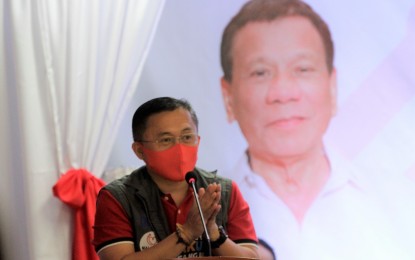
Senator Christopher “Bong” Go (File photo)
MANILA – Senator Christopher “Bong” Go praised the education sector and its stakeholders for their efforts to ensure the continuity of learning and education during the Covid-19 pandemic.
This, after the country earned a five-star rating for remote learning readiness in a study by the United Nations Children’s Fund.
The Remote Learning Readiness Index gave just four out of 67 countries high scores for preparedness in all levels of basic education, including Argentina, Barbados, and Jamaica. To measure their readiness, the index took into account various factors at the household level, the government’s policy response, and emergency preparedness of the national education sector.
“Siguraduhin pa natin na may pantay-pantay na oportunidad ang mga bata na makapag-aral kahit saan mang parte ng bansa sila naroroon at anumang estado nila sa buhay (We will ensure that there’s an equal opportunity to learners wherever they may be and whatever their status in life),” said Go, who serves as a member of the Senate Committee on Basic Education.
“Bigyan natin ng konsiderasyon ang marami na walang pambili ng kagamitan, walang access sa internet at walang pambayad sa matrikula dahil nawalan ng trabaho ang kanilang pamilya dulot ng pandemya (Let’s consider indigents who have no internet access and no money to school fees because their parents lost their jobs due to the pandemic),” he added.
In 2020, the Department of Education issued the Basic Education-Learning Continuity Plan in response to the disruptions to in-person learning caused by Covid-19. The plan directs schools to implement blended learning modalities so lessons can be taught to students in the safety of their homes.
It includes television- and radio-based instruction as well as “DepEd Commons,” an online portal where learning resources may be published and accessed.
The plan also provides for printed or digital modules to be delivered to students’ homes or picked up by their parents. The use of printed modules may serve as an alternative to digital learning or supplement the television broadcast and radio-based instructions deployed by DepEd.
Following the onset of the pandemic, the senator had backed President Rodrigo Duterte’s decision to stop face-to-face classes until it was deemed safe or a vaccine for Covid-19 was available.
He urged the education sector to develop innovative ways to meet the needs of their students while adhering to the physical distancing protocols and other measures set by the government
Go also appealed to the Department of Information and Communications Technology and other relevant agencies to work together to fulfill the vision of providing universal internet access that is stable and affordable for all Filipinos.
“We will take this one step at a time so that we can slowly but surely ensure that education continues without compromising the safety of our students,” he said.
Go co-authored Republic Act No. 11510 which improves support for typically underrepresented students such as indigenous students, students from less privileged backgrounds, and students with physical and learning disabilities.
In particular, the measure institutionalizes the Alternative Learning System and improves the delivery of basic education to the disadvantaged.
The ALS provides students with specialized programs and alternative education approaches and strategies which they otherwise would not be able to receive within the formal learning system.
It also aims to help them develop knowledge, skills, and selected competencies through a combination of learning modalities, including face-to-face learning sessions, modular instruction, digital instruction, and workshops, among others.
On a related note, the senator likewise served as a co-author of Senate Bill 1907, otherwise known as an “Act Instituting Services and Programs for Learners with Disabilities in Support of Inclusive Education.”
The measure aims to enhance the quality of education in the formal learning sector by providing free support services as well as programs that are tailored to the needs of differently-abled learners.
It mandates a Child Find System, a scheme for locating and evaluating learners with disabilities who have not received basic education services and facilitating their inclusion into the general education system.
In 2019, Go also filed SBN 396 which seeks to amend the Local Government Code of 1991 and expand the application of the Special Education Fund. This allows local government units to maximize their resources and adopt new education policies and learning techniques. The measure also allows the fund to be used in the operation of ALS, including the payment of salaries, allowances, and other benefits of ALS teachers.
“Amid the ongoing health crisis, we should continue to look for ways to ease the mental, emotional and financial burdens of our students and their families,” he said. (PR)
